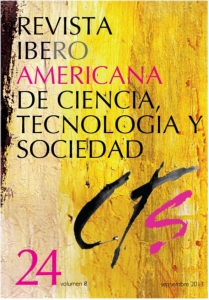Cultural, institutional and technological changes in Portugal
a case study on innovation in fruit juices
DOI:
https://doi.org/10.52712/issn.1850-0013-634Keywords:
innovation, traditional sectors, agri-food industry, high-pressure technologyAbstract
Overlooked by the agendas of innovation studies for many years, mature sectors have attracted increasing interest. This interest has arisen either because these sectors continue to hold a significant weight in the economies of developed countries, or because some empirical studies have shown that companies operating in traditional sectors can be quite innovative, even when their investments in research and development are close to zero. Yet, studies of innovation in mature sectors are still quite scarce, particularly in Portugal. This article describes a case study of a Portuguese innovative horticultural company. The study focuses on the obstacles and opportunities that certain institutional, cultural and technological changes, which have been taking place in Portugal since 1986, have created for the Portuguese horticultural sector. The case describes the process by which an enterprise of a technologically mature industry is able to market a product based on an emerging technology, illustrating in detail the evolution of the complex process of innovation in a “real-life” setting.
Downloads
References
BENDER, G. e LAESTADIUS S. (2005): “Non-science based innovativeness: on capabilities relevant to generate profitable novelty”, Comunicação apresentada à conferência Low-Tech as Misnomer: The Role of Non-Research-Intensive Industries in the Knowledge Economy, Brussels, 29-30 June.
DARBY, M. R. e KARNI, E. (1973): “Free Competition and the Optimal Amount of Fraud”, Journal of Law and Economics, vol. 16, nº1, pp. 67-88.
DELIZA, R., ROSENTHAL, A., ABADIO, F. B. D., SILVA, C. H. O. e CASTILLO, C. (2005): “Application of high pressure technology in the fruit juice processing: benefits perceived by consumers”, Journal of Food Engineering, vol. 67, pp. 241–246.
DENTONI, D. e REARDON, T. (2009): “Can SMEs Build Global Brands with Place-Of- Origin Information? The Role of Social Networks”, comunicação à conferência: A resilient European food industry and food chain in a challenging world, 113th EAAE, Greece, 3-6 Setembro.
EDQUIST, C. e JOHNSON, B. (1997): “Institutions and Organizations in Systems of Innovation” em C. Edquist (coord.): Systems of Innovation: Technologies, Institutions and Organizations, London and New York, Routledge, pp. 41-63.
EFSA (2010): “Food-Related Risks”, Special Eurobarometer 354.
FONBERG-BROCZEK, M., WINDYGA, B., SZCZAWINSKI, J., SZCZAWINSKA, M., PIETRZAK, D. e PRESTAMO, G. (2005): “High pressure processing for food safety”, Acta Biochimica Polinica, vol. 52, pp. 721-724.
HIRSCH-KREINSEN, H. (2008): “Low-Technology’: A Forgoten Sector in Innovation Policy”, Journal Technology Management and Innovation, Vol. 3, nº 3, pp. 11-20.
MENDES, A. B. e CARDOSO, M. G. M. S. (2006): “Clustering supermarkets: the role of experts”, Journal of Retailing and Consumer Services, vol. 13, nº 4, pp. 231-247.
OLSEN, N. V., MENICHELLI, E., GRUNERT, K. G., SONNE, A. M., SZABÓ, E. BÁNÁTI, D. e NAES, T. (2010): “Choice probability for apple juice based on novel processing techniques: Investigating the choice relevance of mean-end-chains”, Food Quality and Preference, vol.22, nº 1, pp. 48-59.
PALMA, F. M., PEREIRA, A. A., PEREIRA, M. M. e BARROS, S. (2006): “O sector da distribuição. Dinamismo e crescimento”, Espírito Santo Research – Research Sectorial.
RASTOGI, N. K., RAGHAVARAO, K. S. M. S., BALASUBRANAMIAM, V. M., NIRANJAN, K. e KNORR, D. (2007): “Opportunities and Challenges in High Pressure Processing of Foods”, Critical Reviews in Food Science and Nutrition, vol. 47, pp. 69- 112.
ROBERTSON, P. L. e SMITH, K. (2008): “Distributed Knowledge Bases in Low and Medium Technology Industries” em H. Hirsch-Kreinsen e D. Jacobson (coord.): Innovation in Low-Tech Firms and Industries, Cheltenham, Edward Elgar, pp. 93-117.
ROBERTSON, P., SMITH, K. e TUNZELMANN, N. (2009): “Introduction: Innovation in low- and medium-technology industries”, Research Policy, Vol. 38, pp. 441–446.
TUNZELMANN, von N. e ACHA, V. (2005): “Innovation in “Low-Tech“ Industries” em J. Fagerberg, D. C. Mowery e Nelson, R.R. (Coord.): The Oxford Handbook of Innovation, Oxford, pp. 407-432.
WILLEMS, S., ROTH, E. e van ROEKEL, J. (2005): “Changing European Public and Private Food Safety and Quality Requirements”, Agriculture and Rural Development Discussion Paper, nº 15.
YIN, R. K. (2009): Case Study Research: Design and Methods, Sage Publications.
Downloads
Published
How to Cite
Issue
Section
License
Copyright (c) 2024 CC Attribution 4.0

This work is licensed under a Creative Commons Attribution 4.0 International License.
All CTS's issues and academic articles are under a CC-BY license.
Since 2007, CTS has provided open and free access to all its contents, including the complete archive of its quarterly edition and the different products presented in its electronic platform. This decision is based on the belief that offering free access to published materials helps to build a greater and better exchange of knowledge.
In turn, for the quarterly edition, CTS allows institutional and thematic repositories, as well as personal web pages, to self-archive articles in their post-print or editorial version, immediately after the publication of the final version of each issue and under the condition that a link to the original source will be incorporated into the self-archive.











